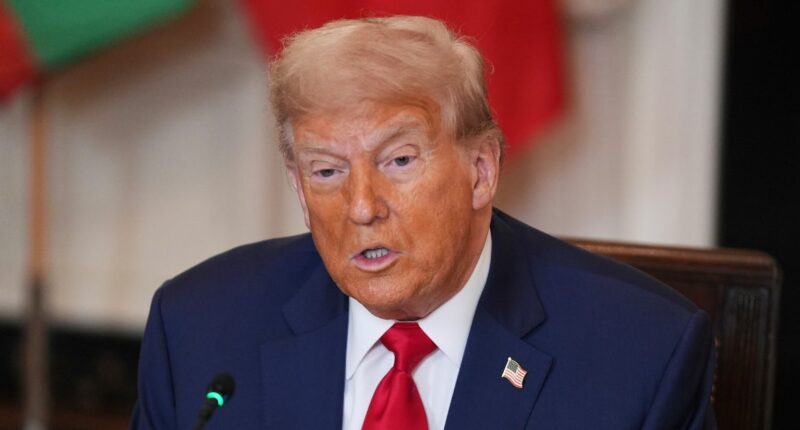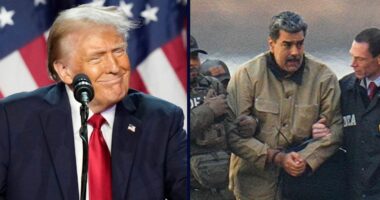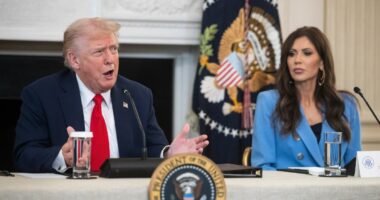Share this @internewscast.com
President Donald Trump addresses attendees during a luncheon with African leaders in the State Dining Room at the White House on Wednesday, July 9, 2025, in Washington (AP Photo/Evan Vucci).
The New York City Bar Association has accused President Donald Trump of orchestrating several murders recently and urges Congress to exercise its constitutional duty as a system of checks and balances.
In a statement released Monday, the organization based in Manhattan criticized the 45th and 47th president for deploying the U.S. Navy to carry out four deadly military strikes on vessels flying the Venezuelan flag in the southern Caribbean during September and early October.
Those attacks have killed at least 17 people and “were illegal summary executions – murders,” according to the voluntary organization.
“Even if, as recently reported, the President has informed Congress that he has ‘determined’ the United States is in an ‘armed conflict’ with drug cartels, these military actions are illegal without congressional approval,” the association asserts.
Trump announced the first “kinetic strike” on Sept. 2 through a Truth Social post – stating that 11 individuals were killed and claiming the vessel was owned by the transnational criminal organization Tren de Aragua, which was allegedly transporting significant amounts of drugs to the United States.
Defense Secretary Pete Hegseth and Secretary of State Marco Rubio validated the attack and other similar military actions in a variety of press briefings and media interviews.
“Instead of interdicting it, on the president’s orders, we blew it up,” Rubio told CNN on Sept. 6. “And it’ll happen again.”
Indeed, on Sept. 15, Sept. 16, and Sept. 19, Trump announced additional fatal attacks had been carried out on small boats in the Caribbean. On Oct. 3, Hegseth announced another such attack.
While the Trump administration has declined to make public any evidence to back up their claims, the evidentiary basis for the fatal attacks appears to be beside the point for the NYC Bar.
The association notes there is ample statutory authority under U.S. law to stop and detain alleged drug traffickers, but says the use of force in such a manner is not compatible with the U.S. Constitution.
“Article I, section 8 of the United States Constitution explicitly reserves to Congress the power to declare war, which over time has meant that Congress must authorize the use of military force,” the statement goes on. “The President serves as Commander-in-Chief, which authorizes him to command the use of force when authorized by Congress and in cases of actual self-defense. Because there has been no such authorization to use force against Venezuela or against ships operating in the area (or any plausible threats justifying self-defense), the President’s military actions against the Venezuelan vessels and their crews cannot be justified as an exercise of the President’s power to use force authorized by Congress.”
Without such an authorization from Congress under the War Powers Resolution, the attacks are – to the last – unlawful, the group says, stressing there is also a statutory dimension to the claims.
“[E]ach of them appears to be an unlawful summary execution prohibited by both U.S. and international law,” the statement continues. “Although the President has, without proof, characterized the victims as ‘terrorists’ and drug traffickers, that claim, even if true, provides no justification for these unlawful executions.”
As for international law, the association says the attacks on the small boats “may also” run afoul of myriad binding U.S. treaty obligations.
Such would-be flouting includes at least one violation of the United Nations Charter and the International Covenant on Civil and Political Rights, as well as three violations of the Charter of the Organization of American States, according to the association.
“Attacking and intentionally killing the crews of private vessels because they are allegedly trafficking narcotics is an arbitrary deprivation of life and a clear violation of this universally accepted foundation of international law,” the statement reads.
The Trump administration, for its part, is attuned to at least some concerns regarding the interplay of the various branches of government.
On Oct. 1, the president communicated a message to Congress announcing the U.S. is in an “armed conflict” with drug cartels and declaring the alleged smugglers to be “unlawful combatants.”
This message from the White House uses the language of the law of armed conflict – which is broadly known as International Humanitarian Law – the principles and rules governing the treatment of people during armed conflicts. The law is perhaps most popularly expressed in the various Geneva conventions and protocols.
But, according to the NYC Bar, this is simply not enough.
The group insists that “absent congressional authorization of these military actions, they remain unlawful” and that there is “neither a lawful nor factual justification to engage our armed forces to use lethal force in international waters in the absence of lawful armed conflict or self-defense.”
The group, founded in 1870, is one of the oldest bar associations in the nation – and very occasionally wades into legal-political controversies, with a marked uptick in such efforts in recent years.
“It’s a pretty big deal that the NYC Bar Association–one of the most prominent and respected bar associations in the country–is accusing the President of ordering the ‘unlawful summary execution,’ i.e. murder–of civilians in violation of US and international law,” Jameel Jaffer, the director of the Knight First Amendment Institute at Columbia University said in a post on Bluesky.
The association says the strikes carried out by the Trump administration demand a forceful response from the legislative branch.
“It is imperative that Congress act promptly, as pending legislation proposes, to make clear to the President and the nation that the President’s threat of similar attacks on Venezuelan vessels (and on Venezuela itself) are unlawful and must not be repeated,” the statement concludes. “Only by doing so can Congress bring our nation into compliance with the Constitution and international law, reduce the risk of hostilities with neighboring countries and assure that similar abuses of Presidential power do not expand to American shores.”
















